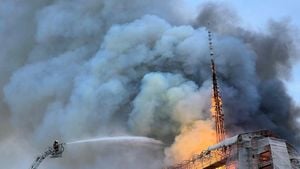With Donald Trump’s election victory echoing like thunder across the globe, the questions surrounding what this means for Ukraine are ringing louder than ever. Trump seized about 51% of the votes, triumphing against Democratic challenger Kamala Harris, who garnered around 47%. This upset has sparked intense discussions not just within American borders but also across the Atlantic, where officials and citizens alike are on high alert for the potential ramifications on U.S.-Ukraine relations and the broader conflict involving Russia.
Since his election night victory, reactions from Ukraine have been decidedly mixed; some officials display cautious optimism, believing Trump’s history of erratic foreign policy may lead him to pursue solutions for peace, albeit with considerable uncertainty. Others, reflecting the more anxious sentiments, warn of significant dangers, particularly the potential cut-off of U.S. military aid, which they view as pivotal to Ukraine's defense against continuous Russian aggression.
Writing for European Pravda, editor Sergiy Sydorenko and journalist Oleh Pavliuk pointed out the stark reality facing Ukraine with Trump at the helm. They argued persuasively against the prospect of NATO membership for Ukraine under Trump, attributing this bleak confirmation mainly to the new president's stance. They insisted without reservation: any chance at NATO membership would have only been feasible with Harris taking office.
Adding to their criticism, The Financial Times reported deeply held fears among Ukrainian military personnel who believe Trump's presidency will usher catastrophic changes. Their worries spotlight the palpable tension: will U.S. military support remain intact, or will they see their hopes dashed as U.S. backing becomes mere rhetoric?
Comments from Volodymyr Fesenko, a prominent political analyst, reflect the nuanced debate swirling around Trump's victory. Though acknowledging the potential dips in financial support, which he fears will be translated to loans rather than direct aid, he suggested this scenario could have been far worse. A Republican-led Congress along with Kamala Harris might have threatened Ukraine’s interests just as severely, rendering Trump's victory less dire by comparison.
Skeptical whispers among Ukrainian officials reveal fears of losing precious military resources. The shared concerns reach the heights of power as military officials characterize U.S. aid as indispensable. “We need to convince Trump to be with us,” one source emphasized, seeing American backing as existential.
Conversely, some analysts believe there's still room for optimism. Oleksandr Merezhko, chair of the foreign affairs committee of Ukraine's Verkhovna Rada, shares cautious optimism about Trump’s intentions. He suggests Trump's desire for success may directly correlate to Ukraine’s performance as his administration’s narrative builds. Success for Trump means Ukraine must be seen as “the success story, not the story of failure,” Merezhko conveyed.
Meanwhile, alarm bells are ringing from Washington as Trump's advisors begin to share plans to alter the U.S. engagement strategy concerning Ukraine and Russia. According to The Wall Street Journal, proposals floating around Trump’s inner circle suggest freezing the conflict at existing frontlines could be the most palatable approach. This could effectively lead to Ukraine ceding substantial territory and put NATO membership aspirations on the backburner for decades. Insightful internal discussions indicate the potential acceptance of proposals involving a demilitarized zone heavily fortified to dissuade Russian advances. Yet, critically absent would be any U.S. military presence.
Adding to the complexity of these proposals, former advisors Keith Kellogg and Fred Fleitz have circulated ideas calling for cessation of military assistance to Ukraine until it resumes talks with Russia. Their tactics, reminiscent of negotiations seen during the Cold War, engender disquiet among those who view Russian territorial gains with grave concerns.
So, where does Trump stand on all this? His election night promise to “stop wars” may seem unequivocal, yet his past hesitancy to support Ukraine openly leaves much speculation. His mixed signals during the campaign—such as not voicing his commitment to Ukraine’s success against Russia—don’t paint the clearest picture either. Trump has claimed he could end the war “in 24 hours,” yet specifics on how remain tantalizingly unclear.
Through campaign rhetoric, he placed significant blame for the war at Biden's feet, even hinting on multiple occasions at the necessity of granting concessions to Russia—a stance he reverted to even during presidential debates. There, he infamously parsed terms, preferring to engage both Putin and Zelensky but offering little clarity as to where his allegiance and policies would finally rest. The voting public questions how sincerity aligns with his actions, particularly denouncing Ukrainian President Zelenskyy for not negotiating effectively.
While Kyiv may be preparing for potential shifts, it's apparent Russian officials are also strategizing their response to Trump's victory. The Russian Foreign Ministry recently affirmed readiness to engage with Trump's administration, asserting their unwillingness to compromise on interests—clear markers of potential diplomatic friction.
Intriguingly, current sentiments within the Kremlin suggest they might have preferred the victory of Harris, with some hoping to capitalize on political discord within the U.S. If true, outlining the fractures within the Trump administration’s pathways for negotiating peace could play to Russia’s advantage.
Trump’s approach to international alliances, especially his prior criticisms of NATO and his promotion of America-first policies, remained echoed during the campaign. Trump’s comments often focused on what he deemed inadequacies among NATO member countries, exacerbated by his previous isolationalist philosophy. His rhetoric hinted at stark changes looming for European partnerships, which sent chills down many spines across the Old World.
Ukraine’s path, once paving unyieldingly toward closer ties with the West, is now poised for a winding road filled with uncertainty. Trump's vocal critiques hint at potential radical changes; allies tremble at the prospects of delayed support and diminished military engagement. And here we are, contemplating what this leadership transition entails for not only Ukraine’s sovereignty but for regional dynamics as well.
Looking forward, it remains to be seen how U.S.-Ukraine relations will evolve under Trump's guidance. His relationship with Zelenskyy, established amid mutual respect, may pivot significantly depending on future expectations. With military aid and investment under potential review, the stakes couldn’t be higher.



